Key Issues Faced by Nursing Professionals in Health Care
VerifiedAdded on 2023/01/09
|8
|2669
|31
AI Summary
This report focuses on the key issues faced by nursing professionals in the health care sector, including bullying and harassment, long working hours, and lack of skill development training. It compares these issues with global trends and emphasizes the need for proper actions and training to address these challenges.
Contribute Materials
Your contribution can guide someone’s learning journey. Share your
documents today.
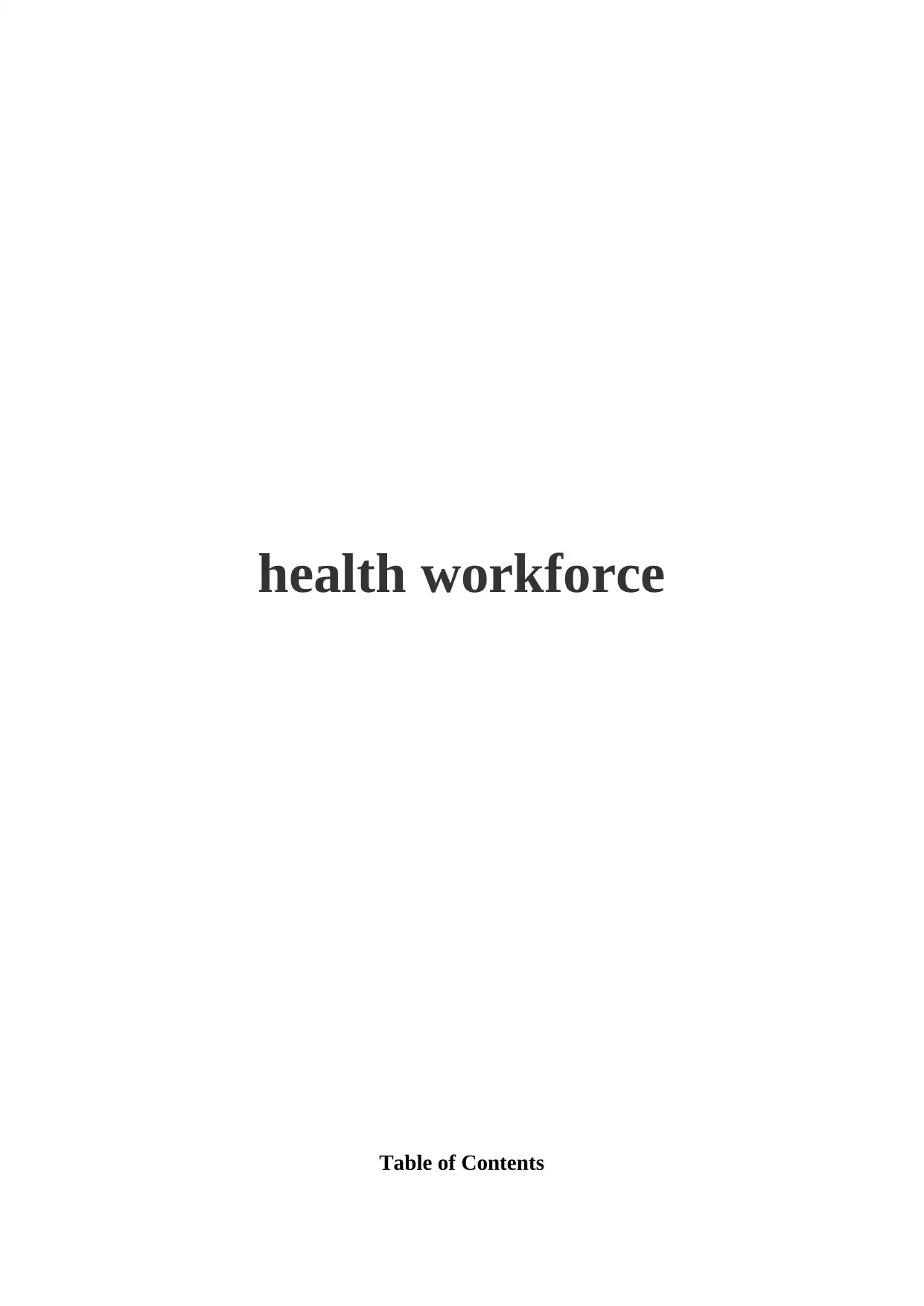
health workforce
Table of Contents
Table of Contents
Secure Best Marks with AI Grader
Need help grading? Try our AI Grader for instant feedback on your assignments.
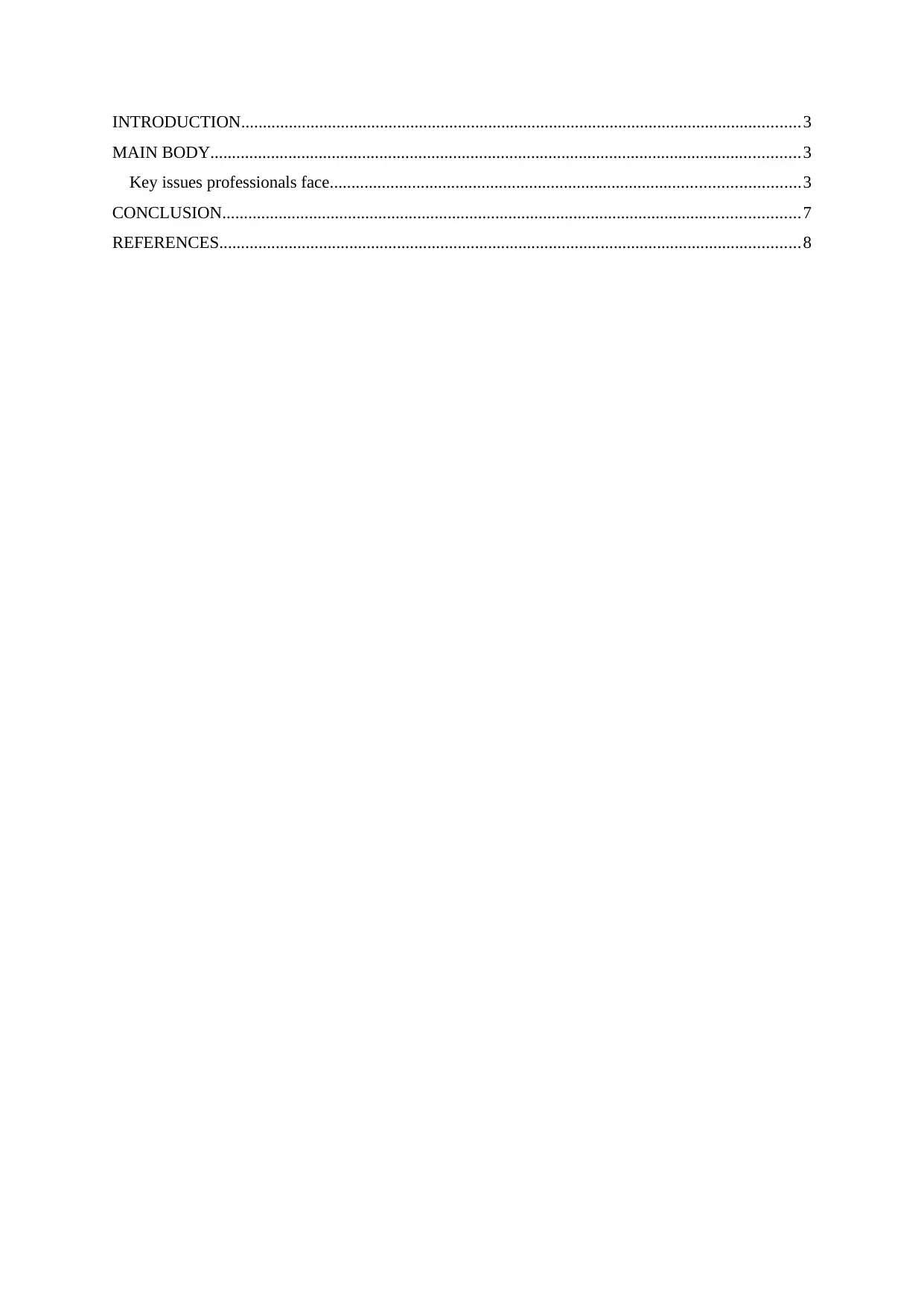
INTRODUCTION.................................................................................................................................3
MAIN BODY........................................................................................................................................3
Key issues professionals face............................................................................................................3
CONCLUSION.....................................................................................................................................7
REFERENCES......................................................................................................................................8
MAIN BODY........................................................................................................................................3
Key issues professionals face............................................................................................................3
CONCLUSION.....................................................................................................................................7
REFERENCES......................................................................................................................................8
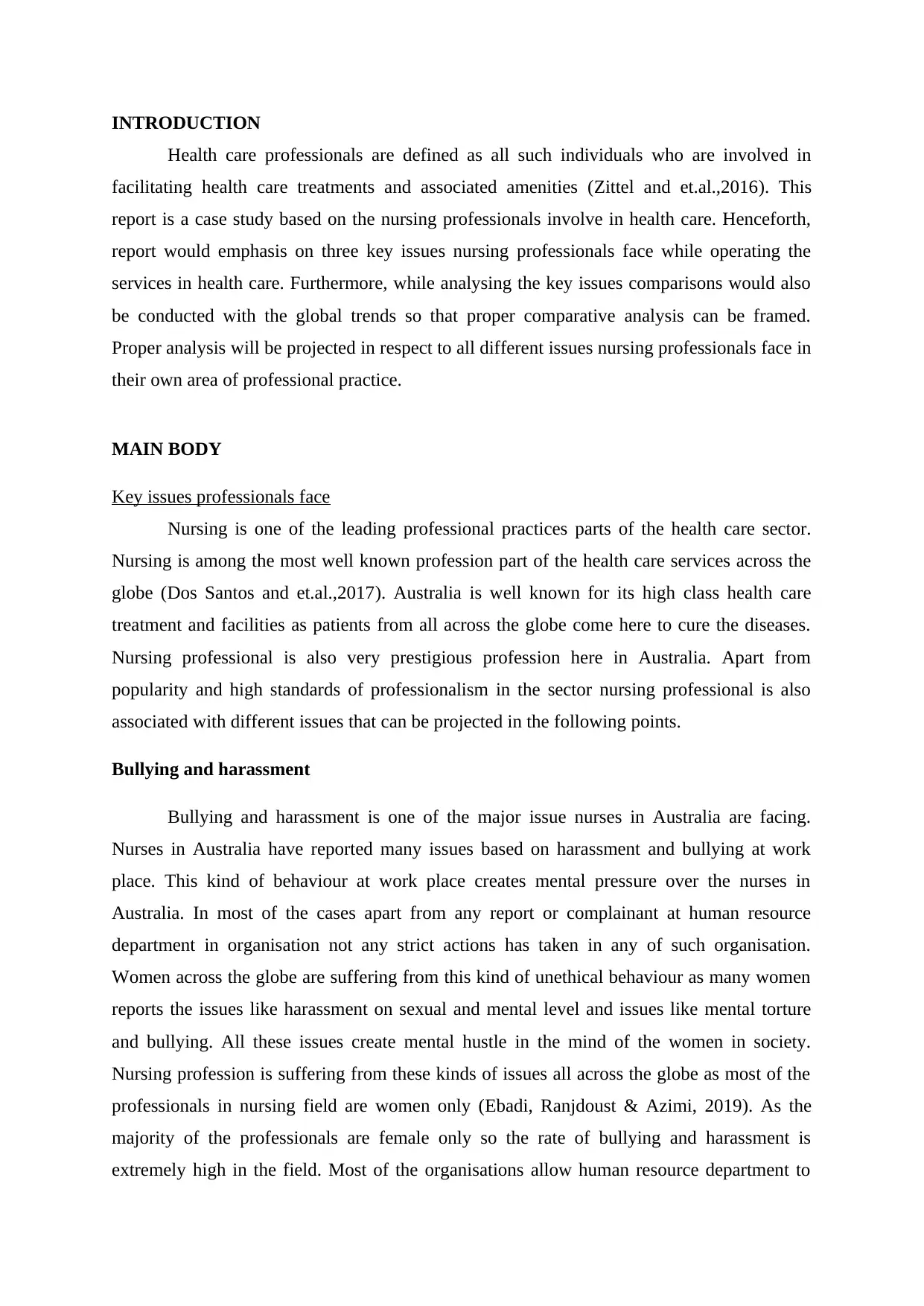
INTRODUCTION
Health care professionals are defined as all such individuals who are involved in
facilitating health care treatments and associated amenities (Zittel and et.al.,2016). This
report is a case study based on the nursing professionals involve in health care. Henceforth,
report would emphasis on three key issues nursing professionals face while operating the
services in health care. Furthermore, while analysing the key issues comparisons would also
be conducted with the global trends so that proper comparative analysis can be framed.
Proper analysis will be projected in respect to all different issues nursing professionals face in
their own area of professional practice.
MAIN BODY
Key issues professionals face
Nursing is one of the leading professional practices parts of the health care sector.
Nursing is among the most well known profession part of the health care services across the
globe (Dos Santos and et.al.,2017). Australia is well known for its high class health care
treatment and facilities as patients from all across the globe come here to cure the diseases.
Nursing professional is also very prestigious profession here in Australia. Apart from
popularity and high standards of professionalism in the sector nursing professional is also
associated with different issues that can be projected in the following points.
Bullying and harassment
Bullying and harassment is one of the major issue nurses in Australia are facing.
Nurses in Australia have reported many issues based on harassment and bullying at work
place. This kind of behaviour at work place creates mental pressure over the nurses in
Australia. In most of the cases apart from any report or complainant at human resource
department in organisation not any strict actions has taken in any of such organisation.
Women across the globe are suffering from this kind of unethical behaviour as many women
reports the issues like harassment on sexual and mental level and issues like mental torture
and bullying. All these issues create mental hustle in the mind of the women in society.
Nursing profession is suffering from these kinds of issues all across the globe as most of the
professionals in nursing field are women only (Ebadi, Ranjdoust & Azimi, 2019). As the
majority of the professionals are female only so the rate of bullying and harassment is
extremely high in the field. Most of the organisations allow human resource department to
Health care professionals are defined as all such individuals who are involved in
facilitating health care treatments and associated amenities (Zittel and et.al.,2016). This
report is a case study based on the nursing professionals involve in health care. Henceforth,
report would emphasis on three key issues nursing professionals face while operating the
services in health care. Furthermore, while analysing the key issues comparisons would also
be conducted with the global trends so that proper comparative analysis can be framed.
Proper analysis will be projected in respect to all different issues nursing professionals face in
their own area of professional practice.
MAIN BODY
Key issues professionals face
Nursing is one of the leading professional practices parts of the health care sector.
Nursing is among the most well known profession part of the health care services across the
globe (Dos Santos and et.al.,2017). Australia is well known for its high class health care
treatment and facilities as patients from all across the globe come here to cure the diseases.
Nursing professional is also very prestigious profession here in Australia. Apart from
popularity and high standards of professionalism in the sector nursing professional is also
associated with different issues that can be projected in the following points.
Bullying and harassment
Bullying and harassment is one of the major issue nurses in Australia are facing.
Nurses in Australia have reported many issues based on harassment and bullying at work
place. This kind of behaviour at work place creates mental pressure over the nurses in
Australia. In most of the cases apart from any report or complainant at human resource
department in organisation not any strict actions has taken in any of such organisation.
Women across the globe are suffering from this kind of unethical behaviour as many women
reports the issues like harassment on sexual and mental level and issues like mental torture
and bullying. All these issues create mental hustle in the mind of the women in society.
Nursing profession is suffering from these kinds of issues all across the globe as most of the
professionals in nursing field are women only (Ebadi, Ranjdoust & Azimi, 2019). As the
majority of the professionals are female only so the rate of bullying and harassment is
extremely high in the field. Most of the organisations allow human resource department to
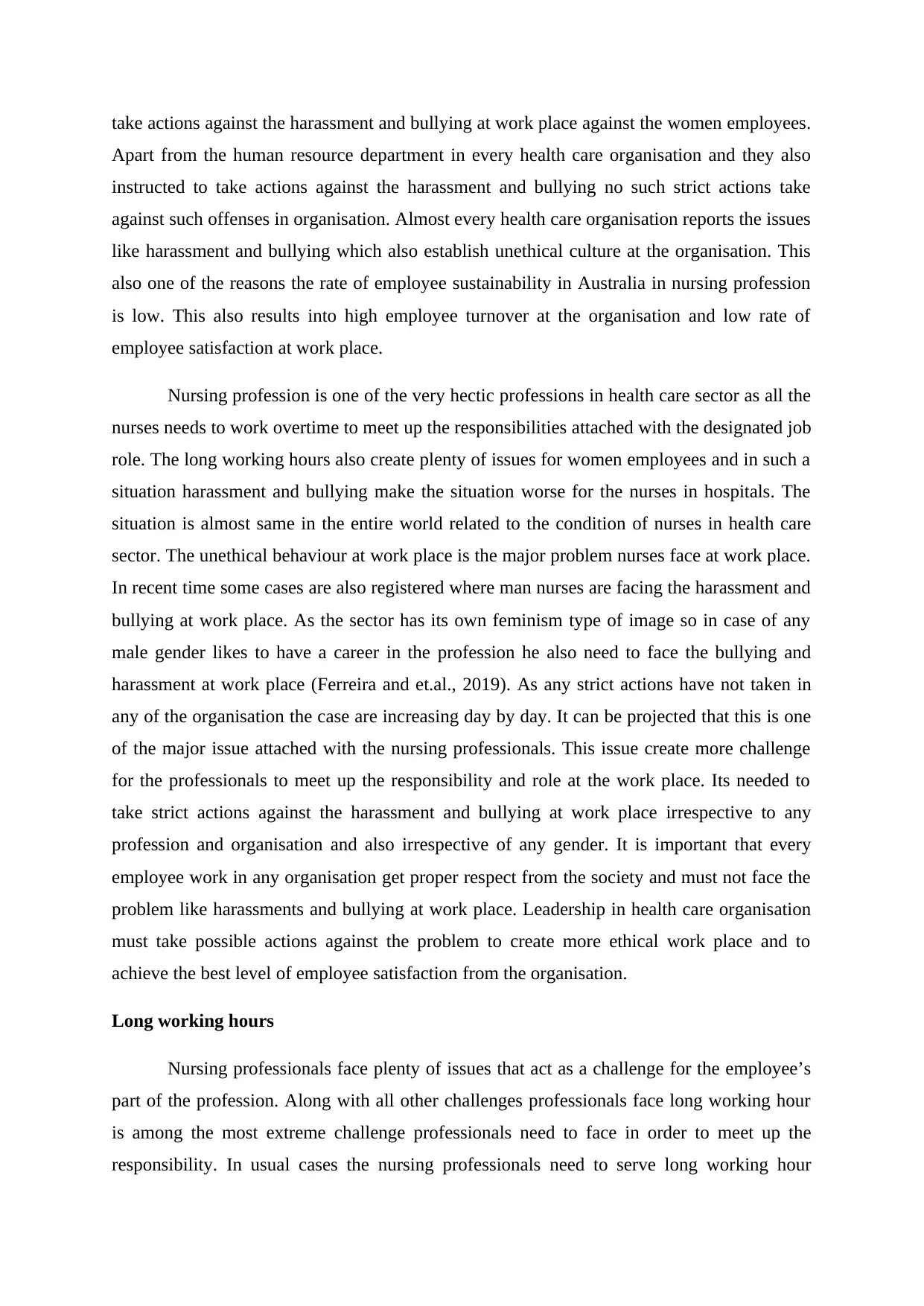
take actions against the harassment and bullying at work place against the women employees.
Apart from the human resource department in every health care organisation and they also
instructed to take actions against the harassment and bullying no such strict actions take
against such offenses in organisation. Almost every health care organisation reports the issues
like harassment and bullying which also establish unethical culture at the organisation. This
also one of the reasons the rate of employee sustainability in Australia in nursing profession
is low. This also results into high employee turnover at the organisation and low rate of
employee satisfaction at work place.
Nursing profession is one of the very hectic professions in health care sector as all the
nurses needs to work overtime to meet up the responsibilities attached with the designated job
role. The long working hours also create plenty of issues for women employees and in such a
situation harassment and bullying make the situation worse for the nurses in hospitals. The
situation is almost same in the entire world related to the condition of nurses in health care
sector. The unethical behaviour at work place is the major problem nurses face at work place.
In recent time some cases are also registered where man nurses are facing the harassment and
bullying at work place. As the sector has its own feminism type of image so in case of any
male gender likes to have a career in the profession he also need to face the bullying and
harassment at work place (Ferreira and et.al., 2019). As any strict actions have not taken in
any of the organisation the case are increasing day by day. It can be projected that this is one
of the major issue attached with the nursing professionals. This issue create more challenge
for the professionals to meet up the responsibility and role at the work place. Its needed to
take strict actions against the harassment and bullying at work place irrespective to any
profession and organisation and also irrespective of any gender. It is important that every
employee work in any organisation get proper respect from the society and must not face the
problem like harassments and bullying at work place. Leadership in health care organisation
must take possible actions against the problem to create more ethical work place and to
achieve the best level of employee satisfaction from the organisation.
Long working hours
Nursing professionals face plenty of issues that act as a challenge for the employee’s
part of the profession. Along with all other challenges professionals face long working hour
is among the most extreme challenge professionals need to face in order to meet up the
responsibility. In usual cases the nursing professionals need to serve long working hour
Apart from the human resource department in every health care organisation and they also
instructed to take actions against the harassment and bullying no such strict actions take
against such offenses in organisation. Almost every health care organisation reports the issues
like harassment and bullying which also establish unethical culture at the organisation. This
also one of the reasons the rate of employee sustainability in Australia in nursing profession
is low. This also results into high employee turnover at the organisation and low rate of
employee satisfaction at work place.
Nursing profession is one of the very hectic professions in health care sector as all the
nurses needs to work overtime to meet up the responsibilities attached with the designated job
role. The long working hours also create plenty of issues for women employees and in such a
situation harassment and bullying make the situation worse for the nurses in hospitals. The
situation is almost same in the entire world related to the condition of nurses in health care
sector. The unethical behaviour at work place is the major problem nurses face at work place.
In recent time some cases are also registered where man nurses are facing the harassment and
bullying at work place. As the sector has its own feminism type of image so in case of any
male gender likes to have a career in the profession he also need to face the bullying and
harassment at work place (Ferreira and et.al., 2019). As any strict actions have not taken in
any of the organisation the case are increasing day by day. It can be projected that this is one
of the major issue attached with the nursing professionals. This issue create more challenge
for the professionals to meet up the responsibility and role at the work place. Its needed to
take strict actions against the harassment and bullying at work place irrespective to any
profession and organisation and also irrespective of any gender. It is important that every
employee work in any organisation get proper respect from the society and must not face the
problem like harassments and bullying at work place. Leadership in health care organisation
must take possible actions against the problem to create more ethical work place and to
achieve the best level of employee satisfaction from the organisation.
Long working hours
Nursing professionals face plenty of issues that act as a challenge for the employee’s
part of the profession. Along with all other challenges professionals face long working hour
is among the most extreme challenge professionals need to face in order to meet up the
responsibility. In usual cases the nursing professionals need to serve long working hour
Paraphrase This Document
Need a fresh take? Get an instant paraphrase of this document with our AI Paraphraser
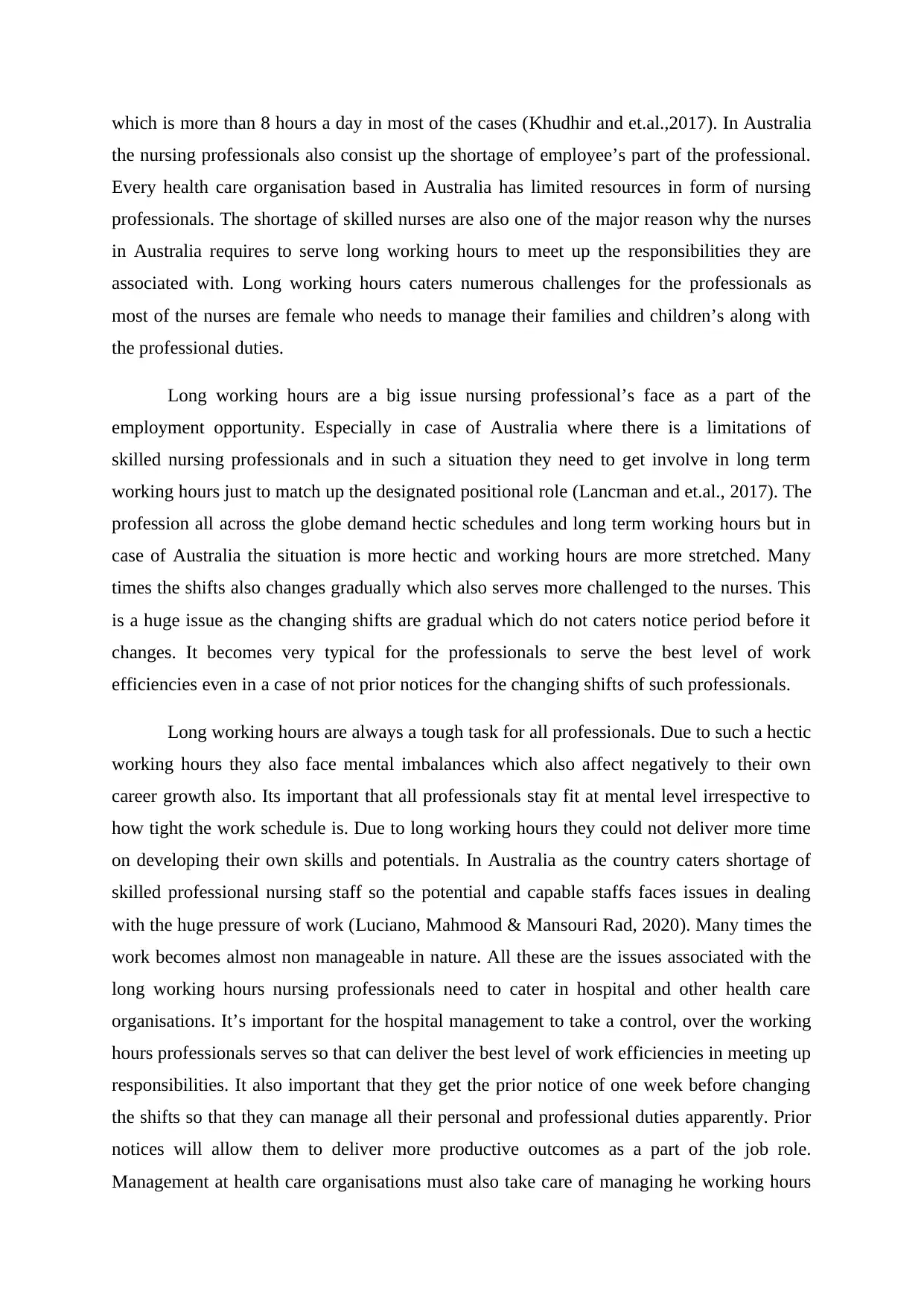
which is more than 8 hours a day in most of the cases (Khudhir and et.al.,2017). In Australia
the nursing professionals also consist up the shortage of employee’s part of the professional.
Every health care organisation based in Australia has limited resources in form of nursing
professionals. The shortage of skilled nurses are also one of the major reason why the nurses
in Australia requires to serve long working hours to meet up the responsibilities they are
associated with. Long working hours caters numerous challenges for the professionals as
most of the nurses are female who needs to manage their families and children’s along with
the professional duties.
Long working hours are a big issue nursing professional’s face as a part of the
employment opportunity. Especially in case of Australia where there is a limitations of
skilled nursing professionals and in such a situation they need to get involve in long term
working hours just to match up the designated positional role (Lancman and et.al., 2017). The
profession all across the globe demand hectic schedules and long term working hours but in
case of Australia the situation is more hectic and working hours are more stretched. Many
times the shifts also changes gradually which also serves more challenged to the nurses. This
is a huge issue as the changing shifts are gradual which do not caters notice period before it
changes. It becomes very typical for the professionals to serve the best level of work
efficiencies even in a case of not prior notices for the changing shifts of such professionals.
Long working hours are always a tough task for all professionals. Due to such a hectic
working hours they also face mental imbalances which also affect negatively to their own
career growth also. Its important that all professionals stay fit at mental level irrespective to
how tight the work schedule is. Due to long working hours they could not deliver more time
on developing their own skills and potentials. In Australia as the country caters shortage of
skilled professional nursing staff so the potential and capable staffs faces issues in dealing
with the huge pressure of work (Luciano, Mahmood & Mansouri Rad, 2020). Many times the
work becomes almost non manageable in nature. All these are the issues associated with the
long working hours nursing professionals need to cater in hospital and other health care
organisations. It’s important for the hospital management to take a control, over the working
hours professionals serves so that can deliver the best level of work efficiencies in meeting up
responsibilities. It also important that they get the prior notice of one week before changing
the shifts so that they can manage all their personal and professional duties apparently. Prior
notices will allow them to deliver more productive outcomes as a part of the job role.
Management at health care organisations must also take care of managing he working hours
the nursing professionals also consist up the shortage of employee’s part of the professional.
Every health care organisation based in Australia has limited resources in form of nursing
professionals. The shortage of skilled nurses are also one of the major reason why the nurses
in Australia requires to serve long working hours to meet up the responsibilities they are
associated with. Long working hours caters numerous challenges for the professionals as
most of the nurses are female who needs to manage their families and children’s along with
the professional duties.
Long working hours are a big issue nursing professional’s face as a part of the
employment opportunity. Especially in case of Australia where there is a limitations of
skilled nursing professionals and in such a situation they need to get involve in long term
working hours just to match up the designated positional role (Lancman and et.al., 2017). The
profession all across the globe demand hectic schedules and long term working hours but in
case of Australia the situation is more hectic and working hours are more stretched. Many
times the shifts also changes gradually which also serves more challenged to the nurses. This
is a huge issue as the changing shifts are gradual which do not caters notice period before it
changes. It becomes very typical for the professionals to serve the best level of work
efficiencies even in a case of not prior notices for the changing shifts of such professionals.
Long working hours are always a tough task for all professionals. Due to such a hectic
working hours they also face mental imbalances which also affect negatively to their own
career growth also. Its important that all professionals stay fit at mental level irrespective to
how tight the work schedule is. Due to long working hours they could not deliver more time
on developing their own skills and potentials. In Australia as the country caters shortage of
skilled professional nursing staff so the potential and capable staffs faces issues in dealing
with the huge pressure of work (Luciano, Mahmood & Mansouri Rad, 2020). Many times the
work becomes almost non manageable in nature. All these are the issues associated with the
long working hours nursing professionals need to cater in hospital and other health care
organisations. It’s important for the hospital management to take a control, over the working
hours professionals serves so that can deliver the best level of work efficiencies in meeting up
responsibilities. It also important that they get the prior notice of one week before changing
the shifts so that they can manage all their personal and professional duties apparently. Prior
notices will allow them to deliver more productive outcomes as a part of the job role.
Management at health care organisations must also take care of managing he working hours
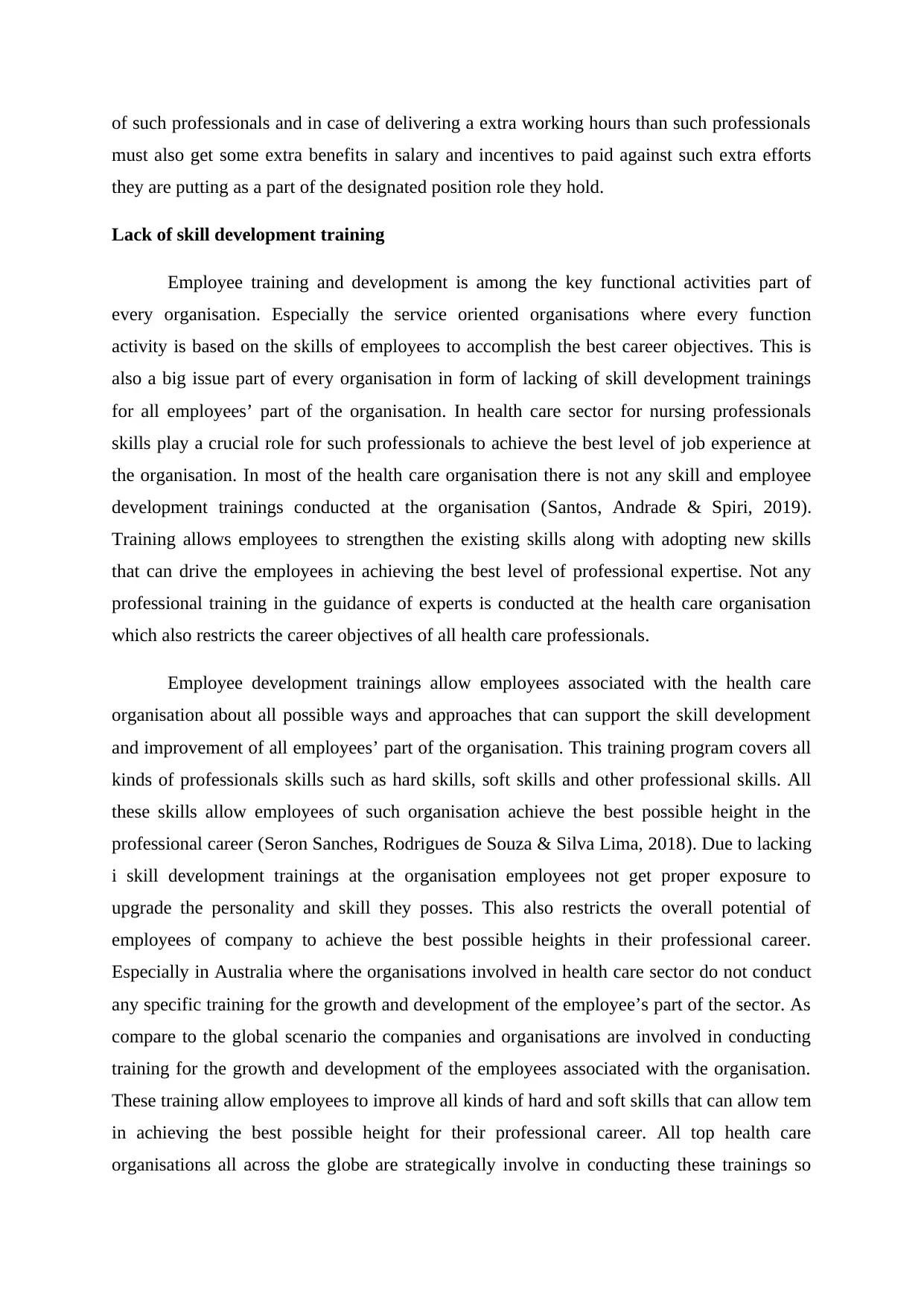
of such professionals and in case of delivering a extra working hours than such professionals
must also get some extra benefits in salary and incentives to paid against such extra efforts
they are putting as a part of the designated position role they hold.
Lack of skill development training
Employee training and development is among the key functional activities part of
every organisation. Especially the service oriented organisations where every function
activity is based on the skills of employees to accomplish the best career objectives. This is
also a big issue part of every organisation in form of lacking of skill development trainings
for all employees’ part of the organisation. In health care sector for nursing professionals
skills play a crucial role for such professionals to achieve the best level of job experience at
the organisation. In most of the health care organisation there is not any skill and employee
development trainings conducted at the organisation (Santos, Andrade & Spiri, 2019).
Training allows employees to strengthen the existing skills along with adopting new skills
that can drive the employees in achieving the best level of professional expertise. Not any
professional training in the guidance of experts is conducted at the health care organisation
which also restricts the career objectives of all health care professionals.
Employee development trainings allow employees associated with the health care
organisation about all possible ways and approaches that can support the skill development
and improvement of all employees’ part of the organisation. This training program covers all
kinds of professionals skills such as hard skills, soft skills and other professional skills. All
these skills allow employees of such organisation achieve the best possible height in the
professional career (Seron Sanches, Rodrigues de Souza & Silva Lima, 2018). Due to lacking
i skill development trainings at the organisation employees not get proper exposure to
upgrade the personality and skill they posses. This also restricts the overall potential of
employees of company to achieve the best possible heights in their professional career.
Especially in Australia where the organisations involved in health care sector do not conduct
any specific training for the growth and development of the employee’s part of the sector. As
compare to the global scenario the companies and organisations are involved in conducting
training for the growth and development of the employees associated with the organisation.
These training allow employees to improve all kinds of hard and soft skills that can allow tem
in achieving the best possible height for their professional career. All top health care
organisations all across the globe are strategically involve in conducting these trainings so
must also get some extra benefits in salary and incentives to paid against such extra efforts
they are putting as a part of the designated position role they hold.
Lack of skill development training
Employee training and development is among the key functional activities part of
every organisation. Especially the service oriented organisations where every function
activity is based on the skills of employees to accomplish the best career objectives. This is
also a big issue part of every organisation in form of lacking of skill development trainings
for all employees’ part of the organisation. In health care sector for nursing professionals
skills play a crucial role for such professionals to achieve the best level of job experience at
the organisation. In most of the health care organisation there is not any skill and employee
development trainings conducted at the organisation (Santos, Andrade & Spiri, 2019).
Training allows employees to strengthen the existing skills along with adopting new skills
that can drive the employees in achieving the best level of professional expertise. Not any
professional training in the guidance of experts is conducted at the health care organisation
which also restricts the career objectives of all health care professionals.
Employee development trainings allow employees associated with the health care
organisation about all possible ways and approaches that can support the skill development
and improvement of all employees’ part of the organisation. This training program covers all
kinds of professionals skills such as hard skills, soft skills and other professional skills. All
these skills allow employees of such organisation achieve the best possible height in the
professional career (Seron Sanches, Rodrigues de Souza & Silva Lima, 2018). Due to lacking
i skill development trainings at the organisation employees not get proper exposure to
upgrade the personality and skill they posses. This also restricts the overall potential of
employees of company to achieve the best possible heights in their professional career.
Especially in Australia where the organisations involved in health care sector do not conduct
any specific training for the growth and development of the employee’s part of the sector. As
compare to the global scenario the companies and organisations are involved in conducting
training for the growth and development of the employees associated with the organisation.
These training allow employees to improve all kinds of hard and soft skills that can allow tem
in achieving the best possible height for their professional career. All top health care
organisations all across the globe are strategically involve in conducting these trainings so
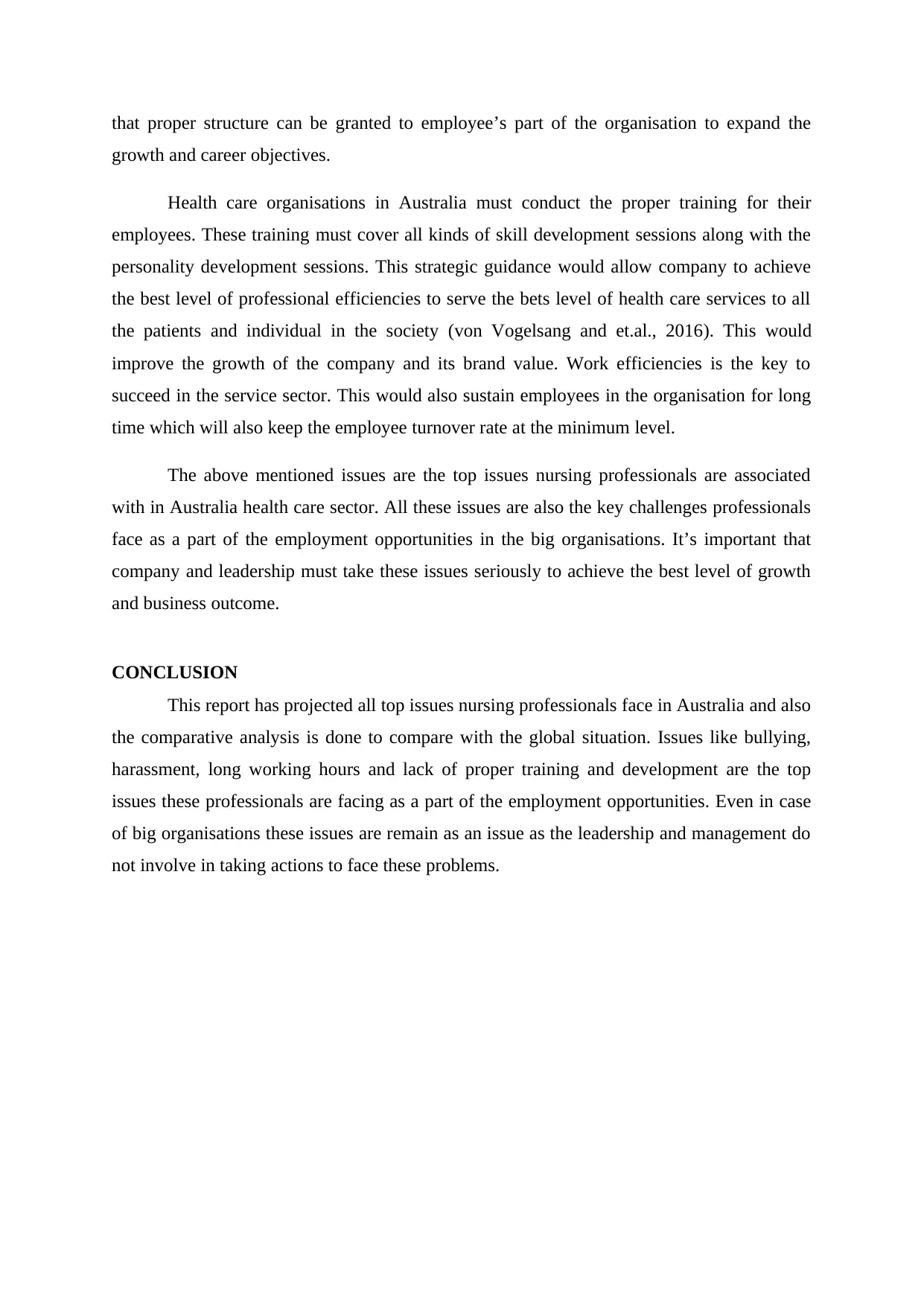
that proper structure can be granted to employee’s part of the organisation to expand the
growth and career objectives.
Health care organisations in Australia must conduct the proper training for their
employees. These training must cover all kinds of skill development sessions along with the
personality development sessions. This strategic guidance would allow company to achieve
the best level of professional efficiencies to serve the bets level of health care services to all
the patients and individual in the society (von Vogelsang and et.al., 2016). This would
improve the growth of the company and its brand value. Work efficiencies is the key to
succeed in the service sector. This would also sustain employees in the organisation for long
time which will also keep the employee turnover rate at the minimum level.
The above mentioned issues are the top issues nursing professionals are associated
with in Australia health care sector. All these issues are also the key challenges professionals
face as a part of the employment opportunities in the big organisations. It’s important that
company and leadership must take these issues seriously to achieve the best level of growth
and business outcome.
CONCLUSION
This report has projected all top issues nursing professionals face in Australia and also
the comparative analysis is done to compare with the global situation. Issues like bullying,
harassment, long working hours and lack of proper training and development are the top
issues these professionals are facing as a part of the employment opportunities. Even in case
of big organisations these issues are remain as an issue as the leadership and management do
not involve in taking actions to face these problems.
growth and career objectives.
Health care organisations in Australia must conduct the proper training for their
employees. These training must cover all kinds of skill development sessions along with the
personality development sessions. This strategic guidance would allow company to achieve
the best level of professional efficiencies to serve the bets level of health care services to all
the patients and individual in the society (von Vogelsang and et.al., 2016). This would
improve the growth of the company and its brand value. Work efficiencies is the key to
succeed in the service sector. This would also sustain employees in the organisation for long
time which will also keep the employee turnover rate at the minimum level.
The above mentioned issues are the top issues nursing professionals are associated
with in Australia health care sector. All these issues are also the key challenges professionals
face as a part of the employment opportunities in the big organisations. It’s important that
company and leadership must take these issues seriously to achieve the best level of growth
and business outcome.
CONCLUSION
This report has projected all top issues nursing professionals face in Australia and also
the comparative analysis is done to compare with the global situation. Issues like bullying,
harassment, long working hours and lack of proper training and development are the top
issues these professionals are facing as a part of the employment opportunities. Even in case
of big organisations these issues are remain as an issue as the leadership and management do
not involve in taking actions to face these problems.
Secure Best Marks with AI Grader
Need help grading? Try our AI Grader for instant feedback on your assignments.
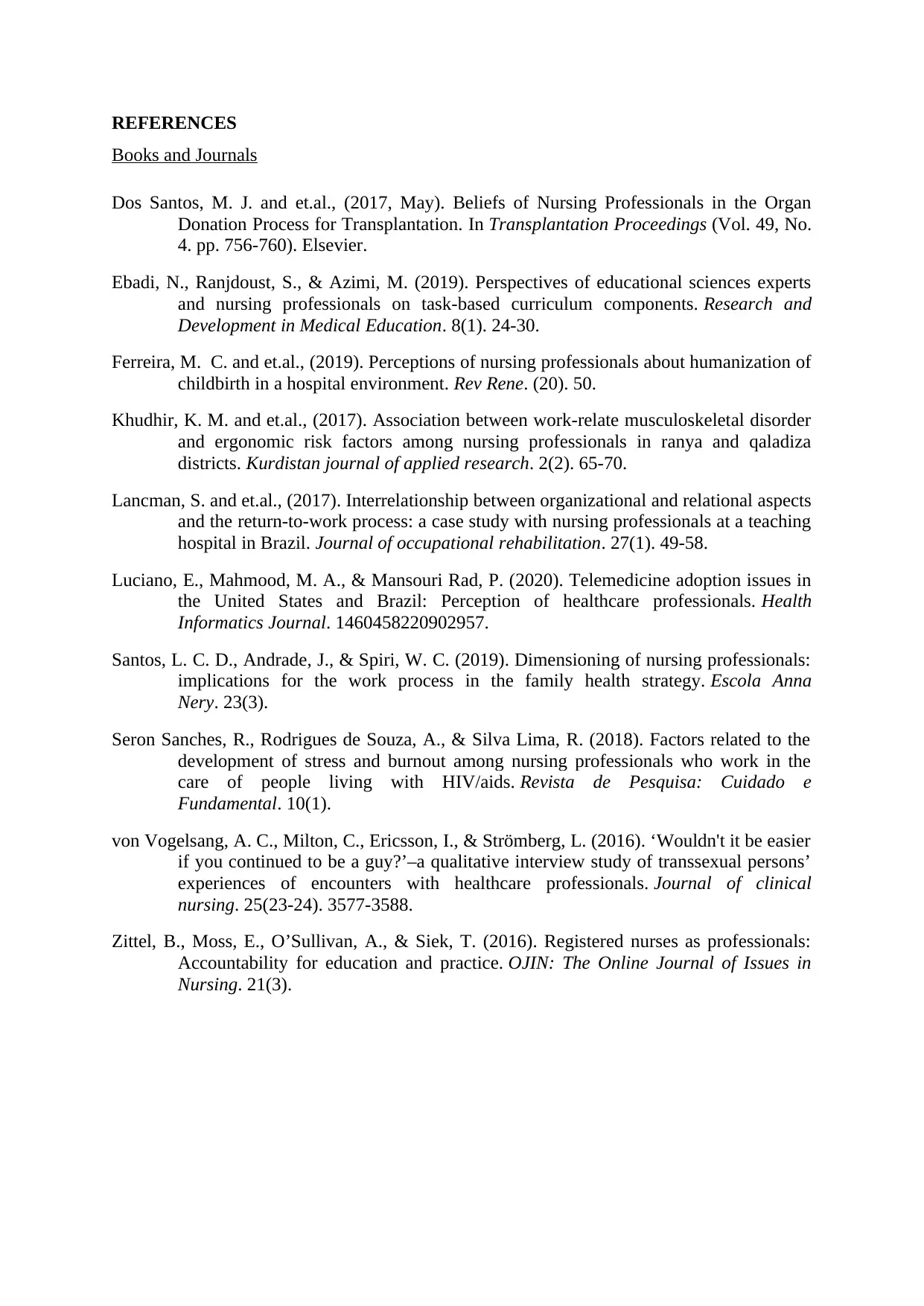
REFERENCES
Books and Journals
Dos Santos, M. J. and et.al., (2017, May). Beliefs of Nursing Professionals in the Organ
Donation Process for Transplantation. In Transplantation Proceedings (Vol. 49, No.
4. pp. 756-760). Elsevier.
Ebadi, N., Ranjdoust, S., & Azimi, M. (2019). Perspectives of educational sciences experts
and nursing professionals on task-based curriculum components. Research and
Development in Medical Education. 8(1). 24-30.
Ferreira, M. C. and et.al., (2019). Perceptions of nursing professionals about humanization of
childbirth in a hospital environment. Rev Rene. (20). 50.
Khudhir, K. M. and et.al., (2017). Association between work-relate musculoskeletal disorder
and ergonomic risk factors among nursing professionals in ranya and qaladiza
districts. Kurdistan journal of applied research. 2(2). 65-70.
Lancman, S. and et.al., (2017). Interrelationship between organizational and relational aspects
and the return-to-work process: a case study with nursing professionals at a teaching
hospital in Brazil. Journal of occupational rehabilitation. 27(1). 49-58.
Luciano, E., Mahmood, M. A., & Mansouri Rad, P. (2020). Telemedicine adoption issues in
the United States and Brazil: Perception of healthcare professionals. Health
Informatics Journal. 1460458220902957.
Santos, L. C. D., Andrade, J., & Spiri, W. C. (2019). Dimensioning of nursing professionals:
implications for the work process in the family health strategy. Escola Anna
Nery. 23(3).
Seron Sanches, R., Rodrigues de Souza, A., & Silva Lima, R. (2018). Factors related to the
development of stress and burnout among nursing professionals who work in the
care of people living with HIV/aids. Revista de Pesquisa: Cuidado e
Fundamental. 10(1).
von Vogelsang, A. C., Milton, C., Ericsson, I., & Strömberg, L. (2016). ‘Wouldn't it be easier
if you continued to be a guy?’–a qualitative interview study of transsexual persons’
experiences of encounters with healthcare professionals. Journal of clinical
nursing. 25(23-24). 3577-3588.
Zittel, B., Moss, E., O’Sullivan, A., & Siek, T. (2016). Registered nurses as professionals:
Accountability for education and practice. OJIN: The Online Journal of Issues in
Nursing. 21(3).
Books and Journals
Dos Santos, M. J. and et.al., (2017, May). Beliefs of Nursing Professionals in the Organ
Donation Process for Transplantation. In Transplantation Proceedings (Vol. 49, No.
4. pp. 756-760). Elsevier.
Ebadi, N., Ranjdoust, S., & Azimi, M. (2019). Perspectives of educational sciences experts
and nursing professionals on task-based curriculum components. Research and
Development in Medical Education. 8(1). 24-30.
Ferreira, M. C. and et.al., (2019). Perceptions of nursing professionals about humanization of
childbirth in a hospital environment. Rev Rene. (20). 50.
Khudhir, K. M. and et.al., (2017). Association between work-relate musculoskeletal disorder
and ergonomic risk factors among nursing professionals in ranya and qaladiza
districts. Kurdistan journal of applied research. 2(2). 65-70.
Lancman, S. and et.al., (2017). Interrelationship between organizational and relational aspects
and the return-to-work process: a case study with nursing professionals at a teaching
hospital in Brazil. Journal of occupational rehabilitation. 27(1). 49-58.
Luciano, E., Mahmood, M. A., & Mansouri Rad, P. (2020). Telemedicine adoption issues in
the United States and Brazil: Perception of healthcare professionals. Health
Informatics Journal. 1460458220902957.
Santos, L. C. D., Andrade, J., & Spiri, W. C. (2019). Dimensioning of nursing professionals:
implications for the work process in the family health strategy. Escola Anna
Nery. 23(3).
Seron Sanches, R., Rodrigues de Souza, A., & Silva Lima, R. (2018). Factors related to the
development of stress and burnout among nursing professionals who work in the
care of people living with HIV/aids. Revista de Pesquisa: Cuidado e
Fundamental. 10(1).
von Vogelsang, A. C., Milton, C., Ericsson, I., & Strömberg, L. (2016). ‘Wouldn't it be easier
if you continued to be a guy?’–a qualitative interview study of transsexual persons’
experiences of encounters with healthcare professionals. Journal of clinical
nursing. 25(23-24). 3577-3588.
Zittel, B., Moss, E., O’Sullivan, A., & Siek, T. (2016). Registered nurses as professionals:
Accountability for education and practice. OJIN: The Online Journal of Issues in
Nursing. 21(3).
1 out of 8
![[object Object]](/_next/static/media/star-bottom.7253800d.svg)





